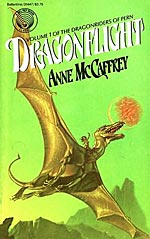
![]() Carl V.
Carl V.
1/31/2013
![]()
Who wills,
Can.
Who tries,
Does.
Who loves,
Lives.
Dragonflight. The iconic Michael Whelan image of a woman triumphantly astride a magnificent winged beast in flight has been imprinted upon my imagination for decades. Anne McCaffrey's two award-winning novellas--"Weyr Search" and "Dragonrider"--were combined into one cohesive novel four months prior to my birth. Around the time I became cognizant of "science fiction" as a genre I can recall seeing this cover image amongst my uncle's collection of SF paperbacks. I borrowed heavily from those shelves in my formative years but never picked up Anne McCaffrey's much-lauded novel.
I think it was because of the dragons.
*Cue cries of incredulity*
The two Stars, Trek and Wars, informed most of what I read in those early years and this did not look like "science fiction". Where were the space ships? Where were the stars? It was many years later that I developed a nearly equal passion for fantasy and by that time the thought of reading this had passed me by.
This year I had determined to read McCaffrey for the first time and decided to host a group reading event of Dragonflight as I know many who are passionate about the Pern series. I decided that I wanted to experience the book not only through my own eyes but through those of people who grew up reading McCaffrey, people who took Pern to their hearts and had not let go. It made for an interesting journey.
To delay any more suspense: I enjoyed the book a great deal. I can see why it remains a classic and why it propelled Anne McCaffrey to the heights she reached in her lifetime. That being said, I found myself quite conflicted about the book. I will be the first to admit that although I empathize with the frustrations women and minorities feel regarding their representation in genre fiction in the past and even today, I have not been as cognizant of this disparity most of my adult reading life. I'm a white American male. Unless the sins were egregious (i.e. sexual assault) I tended not to notice when women were relegated to traditional gender roles in the books I was reading.
My awareness has grown over the years and it is now something I notice as I read, at least to a greater extent than I used to. Imagine my surprise then when I expected to be reading a very pro-feminist science fiction novel only to find that it reveled in some of the same gender stereotyping that had been the standard for decades. I was initially put off, stunned that this would be the case. And as the rest of the story unfolded I found myself in this fascinating conversation with myself, and with the group participants, on what exactly Anne McCaffrey was doing here.
The main question I found myself asking is this: was Anne McCaffrey writing what she knew would get published OR was she just really freaking brilliant?If I was to go on the merits of this book alone (which is all I can do) I would lean towards the later.
In Dragonflight we are introduced to the main female protagonist, Lessa, in an engagingly vague and mysterious manner, only to find ourselves then transported to a scene in which women are being treated no better than property. As Lessa enters the greater tale we catch glimpses of her strength but we also see her own tendencies to slip into traditional gender roles. My initial thoughts were that Anne McCaffrey was a savvy writer who was crafting what she knew would get published. There is probably some truth to that. My feelings began to shift as the second half of the book unfolded and we began to see Lessa assert herself while also being introduced to the idea (and I won't spoil it here) that she is perhaps not the only strong female on Pern. I closed the book wondering if what had really occurred was a brilliant set up in which we are lulled into seeing these characters in traditional roles only to see them later obliterate those gender expectations. It is an opinion I feel myself drawn toward now two weeks after finishing the book.
In a recent short story author Paul McAuley describes a 'romance of regression' and that is how I saw Dragonflight. We find a society that is apparently functioning in a feudalistic manner, battling some mysterious enemy called Thread that emanates from a neighboring planet on a cyclical basis. There are small hints given in this book that the humans on this planet are not indigenous to the world and that in the past they were a more advanced, space-faring society which is what gives Dragonflight its science fictional leanings. For the most part, however, it is a story of a more primitive society that has that kind of sword and sorcery romance element that can be very appealing. In addition to the grand idea of "romance" we have actual romance between two main protagonists that at first falls very much into traditional gender roles--a source of my initial angst--that then grows into something approaching the equality I had expected McCaffrey to champion.
In the end I did not find it at all shocking that readers adore Pern and the novel has the power to captivate new readers as well. It captivated me, as it did with several of the people who read it for the first time in our group reading event. Despite its flaws in regards to gender stereotyping it is a novel that exhibits a tremendous imagination and some deft story telling that makes it a compelling read today.
http://www.stainlesssteeldroppings.com